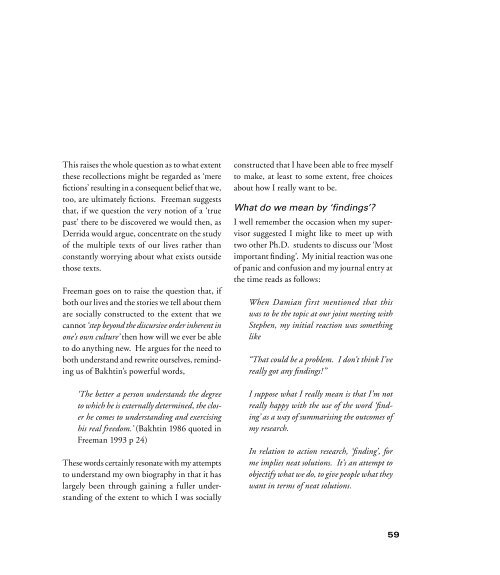Ladda ner utgåvan. - Lärarutbildning - Umeå universitet
Ladda ner utgåvan. - Lärarutbildning - Umeå universitet
Ladda ner utgåvan. - Lärarutbildning - Umeå universitet
You also want an ePaper? Increase the reach of your titles
YUMPU automatically turns print PDFs into web optimized ePapers that Google loves.
This raises the whole question as to what extent<br />
these recollections might be regarded as ‘mere<br />
fictions’ resulting in a consequent belief that we,<br />
too, are ultimately fictions. Freeman suggests<br />
that, if we question the very notion of a ‘true<br />
past’ there to be discovered we would then, as<br />
Derrida would argue, concentrate on the study<br />
of the multiple texts of our lives rather than<br />
constantly worrying about what exists outside<br />
those texts.<br />
Freeman goes on to raise the question that, if<br />
both our lives and the stories we tell about them<br />
are socially constructed to the extent that we<br />
cannot ‘step beyond the discursive order inherent in<br />
one’s own culture’ then how will we ever be able<br />
to do anything new. He argues for the need to<br />
both understand and rewrite ourselves, reminding<br />
us of Bakhtin’s powerful words,<br />
‘The better a person understands the degree<br />
to which he is externally determined, the closer<br />
he comes to understanding and exercising<br />
his real freedom.’ (Bakhtin 1986 quoted in<br />
Freeman 1993 p 24)<br />
These words certainly resonate with my attempts<br />
to understand my own biography in that it has<br />
largely been through gaining a fuller understanding<br />
of the extent to which I was socially<br />
constructed that I have been able to free myself<br />
to make, at least to some extent, free choices<br />
about how I really want to be.<br />
What do we mean by ‘findings’<br />
I well remember the occasion when my supervisor<br />
suggested I might like to meet up with<br />
two other Ph.D. students to discuss our ‘Most<br />
important finding’. My initial reaction was one<br />
of panic and confusion and my journal entry at<br />
the time reads as follows:<br />
When Damian first mentioned that this<br />
was to be the topic at our joint meeting with<br />
Stephen, my initial reaction was something<br />
like<br />
“That could be a problem. I don’t think I’ve<br />
really got any findings!”<br />
I suppose what I really mean is that I’m not<br />
really happy with the use of the word ‘finding’<br />
as a way of summarising the outcomes of<br />
my research.<br />
In relation to action research, ‘finding’, for<br />
me implies neat solutions. It’s an attempt to<br />
objectify what we do, to give people what they<br />
want in terms of neat solutions.<br />
59

















